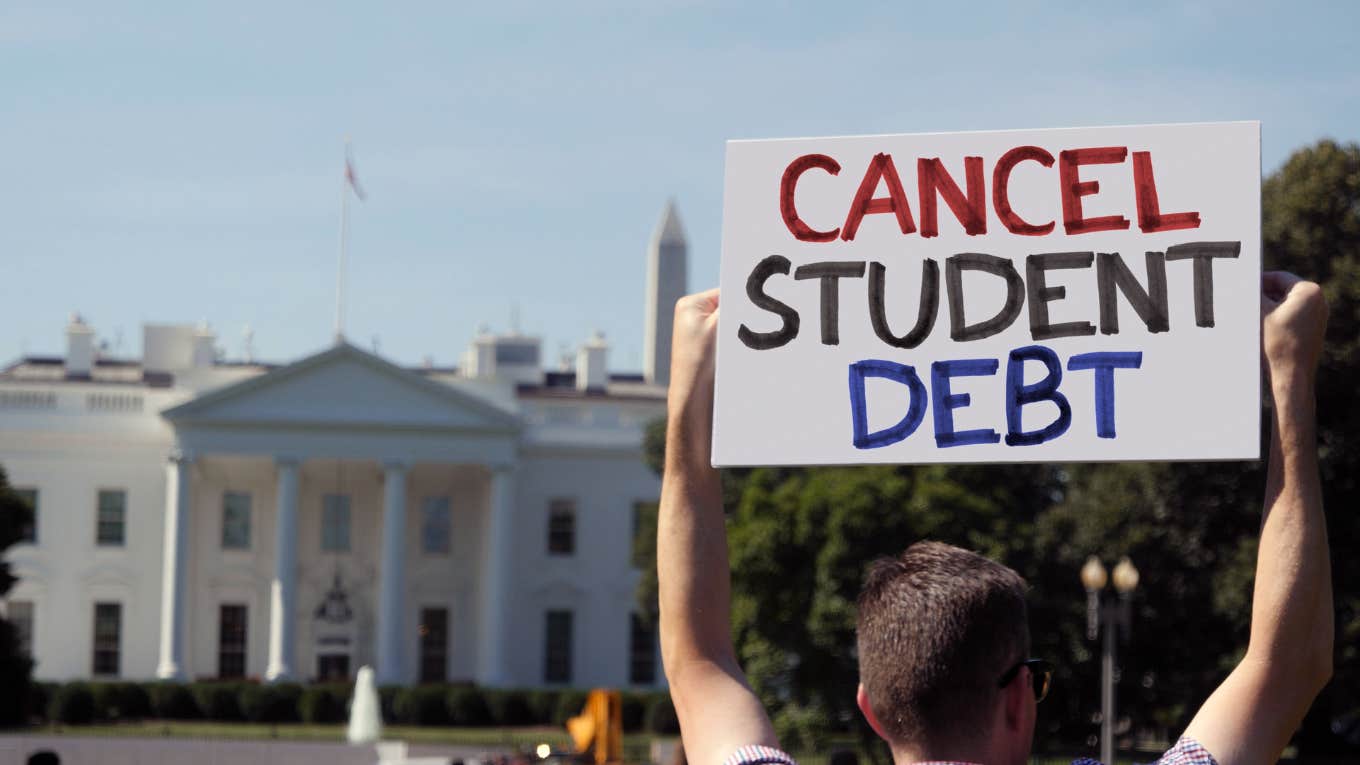A Huge Number Of People With Student Debt Are Refusing To Make Payments To 'Boycott' The System
A huge proportion are not paying because they simply can't afford to. But others are not paying to make a point.
 Orlowski Designs LLC / Shutterstock
Orlowski Designs LLC / Shutterstock If you have student debt, you surely know how financially crippling it can be. And now that payments have resumed, many people are addressing the problem with a simple but risky solution they hope will send a message.
Many people with student debt are refusing to make payments to 'boycott' the student loan system.
Student loan payments started up again in October 2023 following a long moratorium during the pandemic, putting some 43 million borrowers back on the hook for a collective $1.63 trillion in student debt.
Student loan payments were crippling many people financially before the pandemic. But now, we live in a fundamentally different economy, in which the price of everything is inflated — to a large degree artificially — beyond anything we could have expected when student loan payments were first paused back in 2020.
That makes the prospect of student loan payments all the more difficult to manage, and education research firm Intelligent recently dug into how that situation is going for borrowers.
Less than six months in, the short answer is: not well at all.
Millions of student borrowers have missed payments since October or haven't made any payments at all.
Intelligent surveyed 1,000 student loan borrowers about how they've addressed the financial blow of student loan payments, and their findings are pretty startling.
Only 40% of borrowers have made all their payments since the October restart, and 94% of those surveyed say they are struggling financially because of the payments they have made. Sixty percent of them said they have missed at least one payment because of the struggle which the government has said amounts to some nine million borrowers.
Another 25% have made no payment at all. For many, this is because the federal government allowed many borrowers who missed their first payment in October to automatically defer payments until September 2024, part of a 12-month "on-ramp to repayment."
Intelligent found that 18% of borrowers not paying have chosen to wait it out until September because of this program. But the on-ramp program comes with dire consequences beginning October 2024, when federal student loan programs' regular collections policies go back into effect.
Many borrowers have not been cowed by these realities and have chosen not to pay their loans as a form of protest.
Intelligent's survey found a staggering number of people with student debt are refusing to make payments. Of the 25% of respondents who said they haven't made any payments since the restart in October, 1 in 9 — nearly 10% — "are intentionally boycotting to pressure government to cancel federal student loan debt."
If Intelligent's data is representative of student borrowers as a whole, that's millions of borrowers holding billions of dollars in student debt. And Intelligent's data suggests this contingent may keep growing.
In a previous survey performed in August 2023, nearly half of borrowers said they were aware of calls for a boycott beginning with the October restart. More than a third said they were likely to participate, and 86% said they believed holding the line on the boycott would bring attention to the issue.
Despite the dire financial consequences to borrowers, there is some reason to believe a boycott may have an impact.
To be clear, boycotting your student loans comes with major blowback. Student loans are not dischargeable in bankruptcy, which means escaping collections activity is impossible and the damage that defaulting does to your credit rating is essentially irreparable for years.
As for those collection methods, loan servicers' powers are nothing short of draconian, including garnishing wages and retirement accounts, seizure of your tax refunds, and even lawsuits. But many borrowers simply don't care.
Many cite the fact that 17- and 18-year-olds shouldn't be able to take out hundreds of thousands of dollars in debt in the first place. Others say their credit is already ruined anyway, so they have no incentive to continue paying.
And some have even left the country to escape their loans, due to the ways the IRS' handling of foreign income impacts student loan repayment. Expats are also freed from the impacts of credit scores, which most other countries do not have.
Even if that's not an option, however, there is some reason to be cautiously optimistic. Despite the Supreme Court's defeat of President Biden's original student loan forgiveness plan, the Administration has worked to find ways to forgive student debt and retool payment systems within the bounds of the Court's ruling.
Biden's revised SAVE Plan, for instance, could forgive as many as 10 million borrowers' loans later this year and slash many other borrowers' payments significantly.
The bottom line is that the Administration's ears are clearly open to the message that people are angry about, and struggling with, student debt. There's a non-zero chance that moves like a boycott could underline that message to legislators.
That could all change, of course, with the November elections. Borrowers, and voters, beware.
John Sundholm is a news and entertainment writer who covers pop culture, social justice, and human interest topics.

